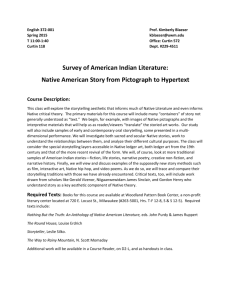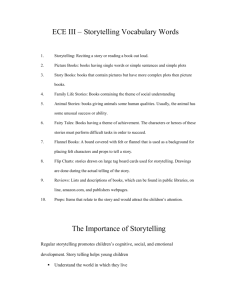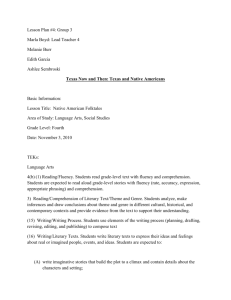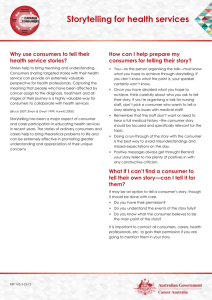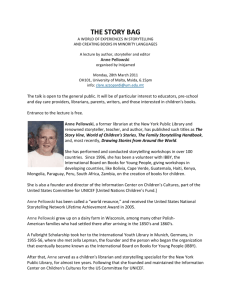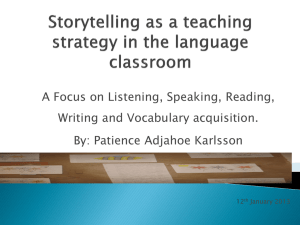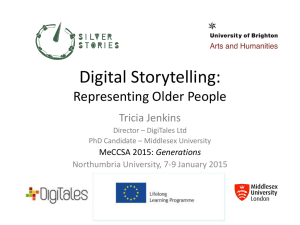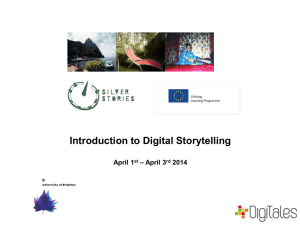Storyknowing - International Centre for Arts and Narrative
advertisement
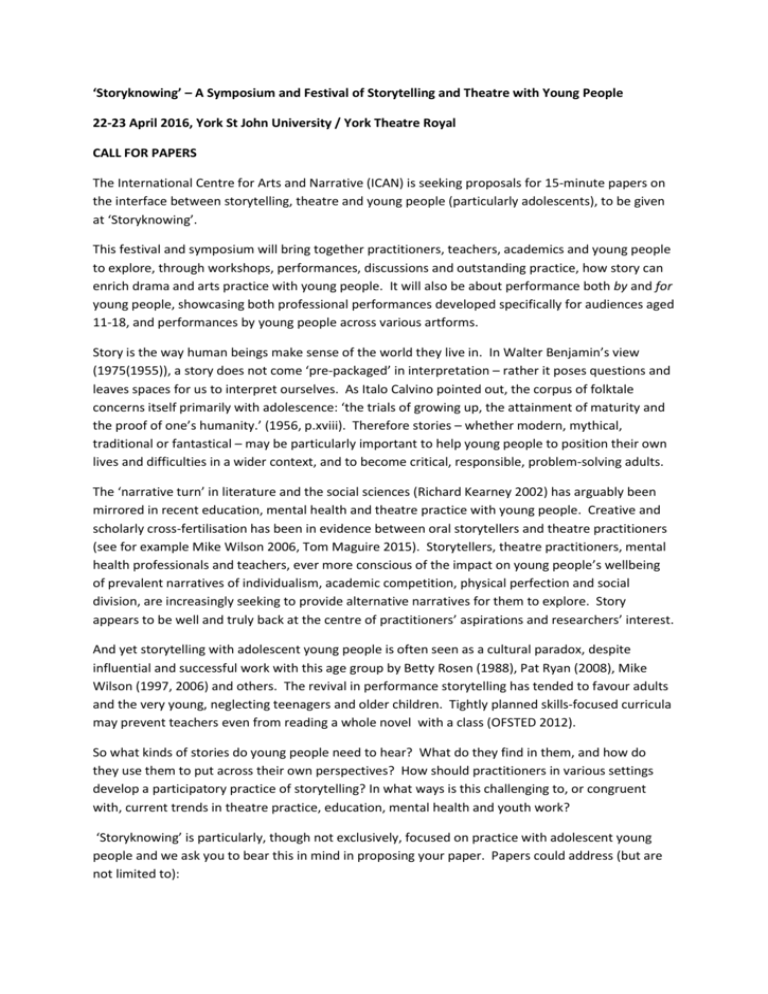
‘Storyknowing’ – A Symposium and Festival of Storytelling and Theatre with Young People 22-23 April 2016, York St John University / York Theatre Royal CALL FOR PAPERS The International Centre for Arts and Narrative (ICAN) is seeking proposals for 15-minute papers on the interface between storytelling, theatre and young people (particularly adolescents), to be given at ‘Storyknowing’. This festival and symposium will bring together practitioners, teachers, academics and young people to explore, through workshops, performances, discussions and outstanding practice, how story can enrich drama and arts practice with young people. It will also be about performance both by and for young people, showcasing both professional performances developed specifically for audiences aged 11-18, and performances by young people across various artforms. Story is the way human beings make sense of the world they live in. In Walter Benjamin’s view (1975(1955)), a story does not come ‘pre-packaged’ in interpretation – rather it poses questions and leaves spaces for us to interpret ourselves. As Italo Calvino pointed out, the corpus of folktale concerns itself primarily with adolescence: ‘the trials of growing up, the attainment of maturity and the proof of one’s humanity.’ (1956, p.xviii). Therefore stories – whether modern, mythical, traditional or fantastical – may be particularly important to help young people to position their own lives and difficulties in a wider context, and to become critical, responsible, problem-solving adults. The ‘narrative turn’ in literature and the social sciences (Richard Kearney 2002) has arguably been mirrored in recent education, mental health and theatre practice with young people. Creative and scholarly cross-fertilisation has been in evidence between oral storytellers and theatre practitioners (see for example Mike Wilson 2006, Tom Maguire 2015). Storytellers, theatre practitioners, mental health professionals and teachers, ever more conscious of the impact on young people’s wellbeing of prevalent narratives of individualism, academic competition, physical perfection and social division, are increasingly seeking to provide alternative narratives for them to explore. Story appears to be well and truly back at the centre of practitioners’ aspirations and researchers’ interest. And yet storytelling with adolescent young people is often seen as a cultural paradox, despite influential and successful work with this age group by Betty Rosen (1988), Pat Ryan (2008), Mike Wilson (1997, 2006) and others. The revival in performance storytelling has tended to favour adults and the very young, neglecting teenagers and older children. Tightly planned skills-focused curricula may prevent teachers even from reading a whole novel with a class (OFSTED 2012). So what kinds of stories do young people need to hear? What do they find in them, and how do they use them to put across their own perspectives? How should practitioners in various settings develop a participatory practice of storytelling? In what ways is this challenging to, or congruent with, current trends in theatre practice, education, mental health and youth work? ‘Storyknowing’ is particularly, though not exclusively, focused on practice with adolescent young people and we ask you to bear this in mind in proposing your paper. Papers could address (but are not limited to): Understandings of applied theatre practice that draw on oral storytelling practice, or vice versa; Learning from specific projects working with young people through story; Storytelling with young people in formal education, informal education, youth work or therapeutic contexts; The role of the storyteller negotiating different goals and models of working (artistic, therapeutic, educational, issues-based) in youth settings; Storytelling as a means of investigating the particular challenges facing young people at this moment in time, or as a means of advocacy by young people; Cross-artform or digital storytelling; Challenges of, and creative solutions to, gauging the benefits of storytelling practice with young people. We are particularly interested in papers that will be accessible to a mixed researcher and practitioner audience. We are open to papers given wholly or partly in the form of performances, dialogues, stories, or other innovative forms which convey your research within the 15-minute timeframe. Please send abstracts (300 words max) to cath.heinemeyer@yorksj.ac.uk by 31st January 2016. REFERENCES Benjamin, Walter (1973(1955)) ‘The Storyteller: Reflections on the Works of Nikolai Leskov’ in Hannah Arendt (ed). Illuminations. London: Fontana. Calvino, Italo (1956) Italian Folktales. Penguin Classics. Kearney, Richard (2002) On Stories: thinking in action. London: Routledge. Maguire, Tom (2015) Storytelling on the Contemporary Stage. London: Palgrave Macmillan. OFSTED (2012) Moving English Forward: Action to raise standards in English, accessed at https://www.gov.uk/government/uploads/system/uploads/attachment_data/file/181204/110118.pdf, Feb 2015 Rosen, Betty (1988) And None Of It Was Nonsense: The power of storytelling in school. London: Mary Glasgow Publications. Ryan, Patrick (2008) ‘Narrative Learning / Learning Narratives: Storytelling, experiential learning and education’, Lecture for George Ewart Evans Centre for Storytelling, University of Glamorgan, Thursday, 29 May 2008 Wilson, Michael (1997) Performance and Practice: Oral narrative traditions among teenagers in Britain and Ireland. Aldershot: Ashgate. Wilson, Michael (2006) Storytelling and Theatre: Contemporary Storytellers and their art. London: Palgrave MacMillan
